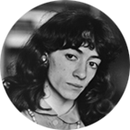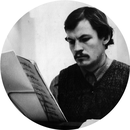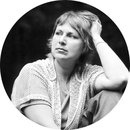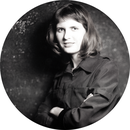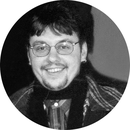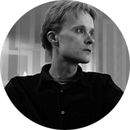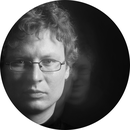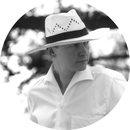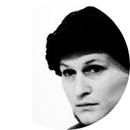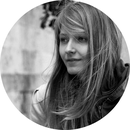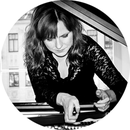The content of the playlist corresponds to the content of the four CDs box set entitled 30 Moments of Druskomanija (the majority of the CDs that had been produced and first released in 2014, were lost in the fire at the Composers’ House in January 2016). The idea behind the collection was to create an audio chronicle of the oldest contemporary music festival in Lithuania. The festival, held annually in May since 1985, has changed its title many times (Youth Chamber Music Days, Young Music etc.), until it assumed its permanent name – Druskomanija – in the 2000s. All of the titles reflect the festival’s youthful spirit, because it is organised by young and restless Lithuanian music professionals – composers, musicologists, performers, and event organisers. The festival was and still is a succession of debuts, a creative lab and a school for many generations.
Although pieces by composers from various generations, and later on from many different countries, have been performing at the festival, this audio chronicle includes only those Lithuanian composers who were part of the younger generation at the time they composed the pieces in question and only the pieces that were both important for their creative biographies and made a big impression in the context of the festival. The majority of the tracks included in the audio chronicle were not recorded live. Live concert recordings at the festival only began in the last two decades.
There are two dates next to each title: the first date indicates the date of composition, the second one the date of its first performance at the festival.

Youth Chamber Music Days concert in the courtyard of M. K. Čiurlionis’ homestead museum in Druskininkai, the 17th of May, 1986. Amongst the listeners: Vytautas Landsbergis, Nomeda Valančiūtė, Rytis Mažulis, Šarūnas Nakas, Gintaras Sodeika, Remigijus Merkelys, Bronius Kutavičius and many others. Photo: Irena Mikužienė, courtesy of the Lithuanian Central State Archives.
Perpetually Young Music
Vita Gruodytė
The annual festival of young composers, musicologists, performers and music managers, important in the period of state formation and because of its location and longevity, that takes place amid nature in the small town of Druskininkai, the remote Mecca of Lithuanian music – the birthplace of M. K. Čiurlionis, the greatest classical Lithuanian composer and painter, functions as a chronicler, capturing the world of music visible exclusively through the eyes of young artists. Having changed its name[1] as often as the teams of its organisers, it has undoubtedly become a reflection of the ideas, experiments, concerns and hopes of every new generation of musicians, at the same time forming a musical mosaic of all of them for over thirty years.
Jauna muzika (Young Music)[2] – young not only in its age but also content – burst on the Lithuanian musical scene like a breath of fresh air, blowing away ideological stagnation and opening a window into the landscape of creative freedom. It provided a platform for musical change without guaranteeing it and gave meaning to its era without promoting itself too seriously or widely.
Leafing through the first festivals’ programmes and publications it becomes clear that what little exists of the documentary material is incapable of reflecting the spiritual and creative uplift that was palpable in the air at that time – the time of budding national movement (Sąjūdis). Audio recordings of that period are scarce and of insufficient quality, but the scores of musical pieces have been preserved and can resound again – only differently now.
The longest-running Lithuanian music festival was established at the beginning of the transformation of the political system and society in 1985 when the then chairman of the Lithuanian Composers' Union Youth Section, composer Ričardas Kabelis initiated the Concert of Compositions by Young Composers at the M. K. Čiurlionis House-Museum in Druskininkai. Having gained incredible momentum over just several years, the festival carried Lithuanian music from one political system to another not only creatively but also emotionally. This powerful spiritual charge is perhaps the secret of the festival's durability. Even the economic blockade in 1990, when the Soviet Union stopped supplying primary raw materials to Lithuania, could not break it. The festival programme was not printed during the blockade (after all, it was not even clear whether the event would take place at all), but the festival's almanack of musicological texts and essays entitled Young Music was published as before. The (not)taking place of the festival was probably supposed to reflect global depression and fear for the future, but actually, by becoming a true happening, actually took on an even more sarcastic form – with the Lithuanian State String Quartet agreeing, after lengthy discussions, to play in a pool, with composers swimming and quietly trying to drown the undrownable – because plastic – mannequin of Dmitri Shostakovich, a symbolic funeral of the festival, and, of course, a closing banquet that featured, as is no doubt appropriate during a political blockade, people dressed in tailcoats and tuxedos dancing aristocratic dances and raising toasts.
Musicians of the older generation were tolerant towards the "teenage" actions of their colleagues or, more often, former and current students, actions which established, without loud declarations but with a manifesto, other, parallel points of reference for music: geographic – a gathering in the province, in Druskininkai, further from the capital’s censorship and conjuncture, and architectural – by spreading music in spaces that did not correspond to the requirements of official culture, such as a summer reading room, a church, a music school, a cinema, next to the mineral springs, under the sanatorium and spa vaults, in the poet Kornelijus Platelis’ living room, by the pedestal to the former Lenin monument, in cafes, etc. In terms of creative ideas, the tendency was to lean on the Lithuanian origins and the never-forgotten Western identity of a "soul preserved in parentheses"[3]: on probably the only unquestionable professional Lithuanian musician – not a patriarch – of the early 20th century Čiurlionis, and on probably the only contemporary artist of Lithuanian origins recognised in the Western world George Maciunas (the entire 1991 edition of the festival was dedicated to his 60th birthday anniversary). The search for starting points in authentic Lithuanian and Western cultural artefacts, in spite of the contextual and geographical contours that continued to limit freedom of expression, reflected the youthful spirit of tabula rasa and the intention of rethinking creativity. In this respect, the festivals definitely provided a collective therapy. Not so much because of the desire to break free from the restraints, because there weren’t many restraints remaining, but rather because of awareness that comes when one begins to feel no longer a part of the system but an independent artist. "Learning to exist in the fullness of one’s being." The path to making this feeling become reality was long. Later, economic hardships ensued, especially for independent artists, but at the time of the first festivals that was still unknown and irrelevant. The relative everyday welfare created by the former – Soviet, oppressive – system for artists as representatives of the "ideological field" still functioned, while the "new world" feeling of free creative expression has already been discovered. For a while, the "flourishing of culture", which began to take kitsch forms, and the "charge of the spirit of resistance" that was expressed and internalised increasingly openly functioned in parallel in this "alternative situation".
In the marginal space of change – not of a change in music but music of change – hope was being sown, and idealistic and idealised, but so real and genuine, contours of an artist’s position in the world were being outlined. Later they faded under the strain of everyday reality, but they haven’t disappeared. Even thirty-five years on, that first generation of musicians and artists who were inspired by the air of freedom did not change. The original creative flight of those Springs of young music, that openness, idealism and perhaps somewhat lesser pragmatism are still recognisable today. The new experience – the state of living on the edge – has definitely become engraved in the subconscious. Following the collapse of the totalitarian system with its ideological stamps, there was a shift from "in relation to", when one is psychologically related to the system in one way (opposing it) or another (surrendering to it) to an existentially insecure and sometimes even frightening autonomy – a relationship to one's self.
The pursuit of "self-discovery", combined with growing awareness not only of one's own creative work but also of that of the entire generation, has led artists to analyse the present. It was an authentic reaction to the environment, "the time of first joys and discoveries." It is the discourse on the threshold of Independence, from which aspects of everyday life are inseparable. Invited to Druskininkai were philosophers, writers, poets and artists, and musicologists were also actively engaged in discussions. Discussions about music and ideology, about poetry and music, about music in the contemporary world, about the openness and closedness of culture – its closedness and it being closed. Idealistic outlines of personal freedom were drawn and fundamental issues were addressed. Artist's responsibilities, the historical context and existential issues were discussed. Aspects specific to creation were explored deeper. There was a turn to the pure essence of sound. To conceptuality. The action replacing the opus. Music and time. Important were not only the means of sonic expression but also musical ideas. The questions what is beautiful and what is ugly in a "fractured view of the world" and what democracy means in music were pondered: whether it should merely cater to an uneducated listener who lives in the comfort of everyday life or it should understand the phenomenon of creativity and one’s own position in society. Reality was not only described but also transformed – through spontaneous discussions, improvised conversations, impromptu creative work, one-off symbolic prizes and collected donations, hurriedly drawn portraits of artists, failed exchanges, fragments of not yet crystalised thoughts, "without any illusions of fundamentally changing the world."
That was the first generation of Lithuanian musicians to publicly discuss various issues. "From unconditional admiration to categorical rejection." The first socially active and rebellious generation. "Adventurously, ironically rational." It created the first forms of cultural opposition – "a solid and valid alternative to stagnant traditions of cultural events".
In this respect, Druskininkai festivals are the most reliable witness to the music of that period. The festival is the cultural event that was both the biographer of change and the initiator of that change. It helped crystallise aspirations of the young people that precisely defined that era – to return to the Western environment through experimentation, discussion and musical action and to retrieve the pre-occupation memory from which Lithuanian music was excluded throughout the Soviet era. The external artificiality inherent in the first festivals organised by the young generation of musicians reflected the internal need for change. Their imperfections – or perhaps even the deliberate apologetics of precisely executed imperfections – were laying the foundations for openness. A meaningful experience of “common cause” was being discovered: there was the striving to form a guild (a creative one, as opposed to political), to communicate, to seek like-minded peers here and elsewhere, to solve creative problems here and now, to abandon habits and boundaries, to look at oneself through another’s eyes (musical pieces by musicologists, composers’ conversations about music) and, of course, the need to analyse – not just one’s own self, but also the world around.
The texts of the four issues of the Young Music publication[4] speak about moral revival. About "honest man" and "true art": "do not lie to yourself" because "false culture is barren". It is a sign of the political, epistemological and ontological crisis of the time. Religious thematics are brought back. "The truth of our feelings unfolding in reality." Cited are Thomas Mann, Friedrich Nietzsche, Antoine de Saint-Exupéry, Hermann Hesse. Concepts of Truth, Homeland, Ideal, Harmony and Spirituality take on their truest and deepest meaning – that of aspiration. It is supposed to protect against future missteps, against progress based on pure efficiency. At the same time, it is also an expression of a cultural tradition that has been broken in Eastern Europe.
Thus, the first independent music festivals gathered and encouraged, created and analysed. The regained psychological freedom seemed not only fragile, but also possibly short-lived, so there was a rush to discuss fundamental issues and alter the existing habits. For example, an entire edition of the festival (in 1994) was dedicated to the then young composer Rytis Mažulis, without waiting for the legitimisation of any traditionally glorious anniversary, a list of merits or medals received. Later, there was a period of paying respect to Master Julius Juzeliūnas, a turn back towards the history of Lithuanian music of the 20th century, and the themes for future gatherings were no longer being chosen hastily. From then on, they will always reflect their time, personal ideas of the organisers or participants’ creativity. Musically, this festival will always, without any pre-existing critical view, give freedom to emerging ideas and maintain confidence in the artistic, creative and organisational power of young composers. This constant, nurtured from the outset, has already raised several generations of musicians, who came to realise the fragility of time allocated for their creative searchings precisely in the limited space of the month of awakening spring.
The feeling discovered and cultivated in the origins of Sąjūdis, the Lithuanian independence movement – of political freedom that turned into the creative, true freedom of musical thought – is the most beautiful legacy this festival could have passed down from generation to generation. Therein lies its strength and, hopefully, the secret of enduring longevity. The composer Osvaldas Balakauskas’s wish to Young Music to never grow old is really being fulfilled, and more.

A concert of the contemporary music festival Druskomanija near the Druskininkai City Museum, the 20th of May, 2017. Gintė Preisaitė (keyboard), Kristupas Gikas and Vytautas Oškinis (flutes) performing Trio by Mindaugas Urbaitis.
[1] 1985 – Concert of Compositions by Young Composers
1986 – Youth Music Day
1987-1989 – Youth Chamber Music Days
1990 – It was not called anything, the programme was not printed
1991 – Youth Music Days
1992 – Young Music
1993-1995 – Youth Chamber Music Days
1996 – Chamber Music Day
1997 – Youth Chamber Music Days
1998-1999 – Youth Music Days
Since 2000 – Druskomanija
[2] The festival, organised by young composers and musicologists, was changing its official name to meet the requirements of that period – a necessary designated "administrative" definition of a cultural event. However, for many years since its inception, it was this "unofficial" name – Young Music – that really took root among the festival's organisers and visitors.
[3] Used here and throughout the text are quotations from first festival reviews and essays.
[4] Between 1987 and 1990.


